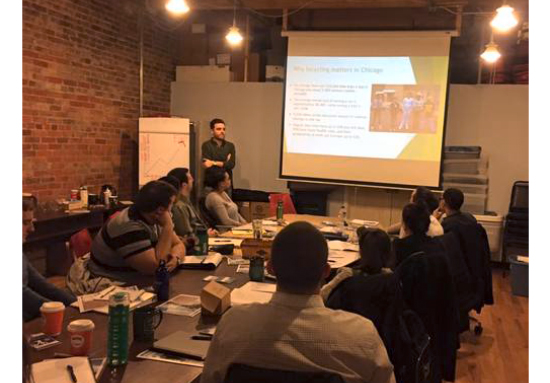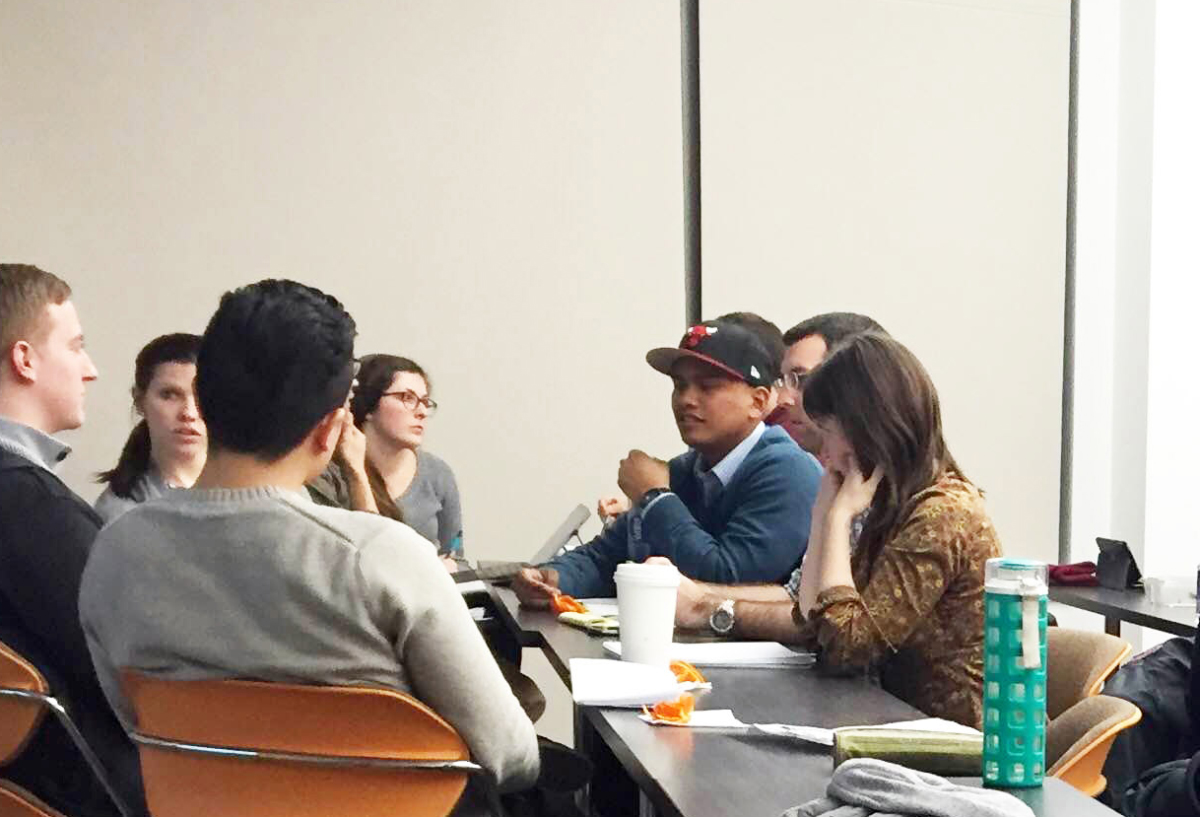With more than half the planet living in cities, there is no more pressing issue than to determine how to develop sustainable urban life. DePaul’s two-year, master’s program in Sustainable Urban Development (SUD), housed in the College of Liberal Arts and Social Sciences, provides a broad, practical, and holistic approach to educating those interested in careers that focus on building socially, economically and environmentally sustainable cities. About 40 students are currently enrolled in the program, which is one of the first of its kind in the nation.
 SUD Students at Active Transit Alliance, Winter 2016
SUD Students at Active Transit Alliance, Winter 2016Now in its third year, SUD embodies an interdisciplinary approach to sustainable urban development that emphasizes engagement in the City of Chicago through a 100-hour internship. An essential element of the program is that students balance theories of urban development with learning technical skills that prepare them for professional opportunities in the public, private and nonprofit sectors.
“When the term ‘sustainable’ is used, it sometimes refers to environmental concerns, says Euan Hague, Professor and Chair Department of Geography. “But the SUD program has a wider outlook. We are interested in how you can produce an urban environment that is cleaner and healthier and more livable. A sustainable city is environmentally sustainable – but also economically and socially sustainable.” The SUD program is co-directed by Hague, Howard Rosing, Executive Director of the Steans Center, who teaches and coordinates the practicum course, and Joe Schwieterman, Professor of the School for Public Service. Schwieterman is also director of DePaul’s Chaddick Institute for Metropolitan Development.
“The SUD master’s builds on our existing strengths,” adds Hague. Students, he says, can learn geography skills through current courses that teach urban data mapping and urban planning. Other courses address environmental issues, food systems and transportation. “We have worked to leverage what we offer into a coherent degree program,” he says. One example is a capstone project that focused on Chicago’s Rogers Park community through which students employed skills in map making, statistics, urban design software and more. The project featured research that addressed an array of issues that impact this diverse community including food access, health care services and transportation.
Schwieterman says the SUD program is consistent with DePaul’s strong urban mission as well as its growing concern that principles of sustainability need to be rooted in DePaul’s curriculum. “The two have come together in this program,” he says. Schwieterman adds that the SUD program teaches students technical skills that can “help neighborhoods be more sustainable.”
For students in the program, learning about sustainability in an urban context is about intentionally crossing disciplinary boundaries. “We want them to not get tied to a single disciplinary approach,” says Howard Rosing, “and to engage communities from the perspective that residents have ideas and the capacity to inform the process of neighborhood and urban development.” That means the program accepts students with an array of academic and professional backgrounds who share a common goal of exploring how to sustainably resolve social and economic inequality and the growing number of ecological challenges faced by cities. As Rosing notes, “our students learn to see power relations that both hinder and support sustainable community development.” Most importantly, he says, “they gain skills to support organizations and future employers in their efforts to improve the lives of people living in cities. That is what makes the program DePaul in nature.”
"We want them to not get tied to a single disciplinary approach and to engage communities from the perspective that residents have ideas and the capacity to inform the process of neighborhood and urban development..."
Students who complete the SUD program will be prepared for opportunities in a variety of fields. “Sustainability: Higher Education’s New Fundamentalism,” published in March of 2015 by the National Association of Scholars states that, according tot the U.S. Bureau of Labor Statistics, more and more organizations will employ sustainability professionals. “As sustainability becomes more widespread,” the article notes, “new opportunities to contribute to the field will arise.” Tracking this growth, the SUD Program, with support from a variety of DePaul academic departments, including the School of Public Service and the Steans Center, seeks to educate students to think critically about what sustainability means in cities as well as have the hands-on skills to engage in careers as sustainability professionals.
Alumni
When he first learned about the SUD program, Noah Boggess said he “liked the opportunities it looked like the program would give me.” As part of the SUD degree he spent a week in Brazil to study a public transportation system. In another course, he learned computer modeling software and “that really beefed up my portfolio,” he said. In still another course he learned about creative zoning ordinances and development in Skokie, IL and eventually he interned at the Congress for New Urbanism. Boggess is now a research analyst for DePaul’s Institute of Housing Studies, a research center that informs housing policy decisions in Chicago and nationally. “I would tell anyone thinking about the SUD program that you can learn about sustainable development and best practices – and the program offers a great way to focus on a nonprofit or government in an internship.”
While enrolled in the SUD program, Allison Wojtowicz interned at Common Threads, a national nonprofit that delivers culturally-relevant cooking and nutrition curriculum for kids in underserved schools and communities. Now she is working full-time for the organization. She says that studying GIS (Geographic Information Systems) through the SUD program “opened my eyes about its potential – now I know much more about how to use knowledge learned in GIS to prove or analyze something with a mapping tool.”
“When I came to Common Threads as an intern,” Wojtowicz adds, “I used GIS skills I learned in the master’s program and worked with the groups to study and analyze current markets.” Wojtowicz currently works as the organization’s quality assurance and compliance coordinator, conducting evaluation and research of the group’s programs. “In a good and challenging way, the SUD degree is very broad,” she says. “Every class and project, you could make your own and apply it to serving underserved communities. The program is so intertwined in so many different aspects of urban living.”
Current Students

Like her classmates in the SUD program, Dominique Edwards has benefited from experiences that build on her work in the classroom. Edwards found a job as director of development for Gary Urban Farms in Gary, IN and later developed a project for a GIS class based on the organization’s interests. She describes her experience in the program career-changing. “The program has opened up so many doors for me in such a short time,” she says. “I feel like I’m more marketable in one year than I was in almost ten years of having a biology degree. The program also has a phenomenal support group.”
Jacob Horn came to DePaul with a strong background in music, but was also interested in urban food issues. While studying music at Lawrence University in Wisconsin, he helped run a small farm; he says “we were a school club that turned a profit.”. In the SUD program, Horn completed an internship with the Greater Southwest Development Corporation in Chicago, a community development organization where his project involved trying to establish the feasibility of doing a food scrap pickup composting program. “They brought me in and said ‘We want to work with grocery stores and restaurants to develop a compositing program. Here are the resources we have. What can you do?” Horn notes that a valuable part of the experience was meeting with classmates to discuss what was going on in their internships. “It was like professional development. Even though we were doing different internships, we learned from each other.” “The SUD program really allows you to focus on what sustainability means to you,” says Horn, who is now a research assistant on an urban composting project for the Steans Center. “Food access isn’t just one issue – it relates to transportation, economic development and other issues.”
Joana Zaidan, who moved from Brazil to Chicago for the SUD program, describes what was appealed to her about DePaul’s approach. “The multidisciplinary aspect of it – it’s very different from other programs. I wanted to get into urban planning, but at the same time I was interested in other areas as well – like geography and public service,” she says. “I’ve been able to learn about all of these areas in the program. Plus, classmates have different backgrounds, and that makes learning a richer experience.”
One of her experiences in the program involved conducting research for a community organization on community gardens in Humboldt Park. For another project, she studied mixed-use development in Skokie and presented images of maps, structures of interest, parking lots and other detailed and key elements related to development in the community. “The program is very hands-on when it comes to learning different skills,” she Zaidan, who has a background in design. She sees SUD as guiding her to bring her years of experience in architecture and design into public spaces.
"The SUD program really allows you to focus on what sustainability means to you. Food access isn't just one issue - it relates to transportation, economic development and other issues..."
In the Community
On Chicago’s southwest side, Tina James works as the Director of Commercial and Technology Services at the Greater Southwest Development Corporation (GSDC). “Every year,” she says, “We wonder, how can we work to develop environmental sustainability in a way that intersects with our small business community?” That’s where SUD student Jacob Horn came in. “He did some investigating – and relationship-building – that included interviews with restaurant and grocery store owners, waste removal and picking up compost,” says James. She says that “the premise of working with students is a wonderful idea and great for community development. We get access to a student’s perspective and skills and benefit from their time and effort.” In the future, James says, perhaps a sustainability project can also connect even more with other community needs, like the need for economic stability and safe neighborhoods. That would be consistent with the SUD program’s approach, which embodies a holistic vision of sustainability and how it relates to a variety of urban issues.
Stephanie Folkens, Curriculum and Quality Assurance Manager with Common Threads, saw the impact of the SUD program through the organization’s experience with Allison Wojtowicz. Common Threads works with about 85,000 people nationally – students, faculty and parents – through a variety of in-school and after-school nutrition education programs. Folkens says that “working with students who are interns, it’s important to give them a strategic project on which they can demonstrate leadership, project management and innovative thinking. When Allison came to us, she reached out to us to get some community experience. We place a huge emphasis on evaluation, and collect pre- and post-surveys from students. Allison was brought in to help manage that data. At the time, we were also launching a GIS mapping project. She came in and helped move that project.” Now, with Allison as a staff member, Folkens says that “having someone with her skill set gives us expertise around the sustainability piece. She gives us tools to make a more informed decision.”
For more information on the MA in SUD visit: las.depaul.edu/academics/sustainable-urban-development